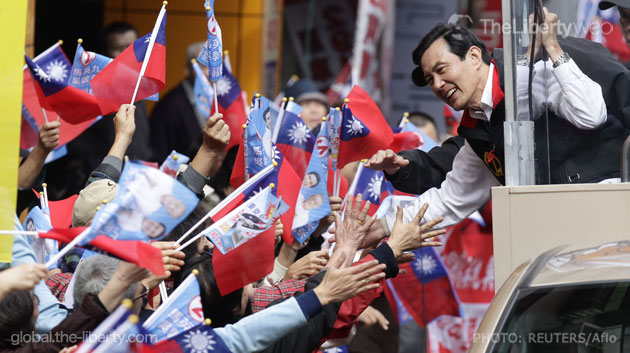China moving towards Taiwan, not Taiwan towards China
In Taiwan’s presidential elections in January, Ma Ying-jeou, chairman of the Kuomintang was re-elected for a second term in office. This time, we sent our own news team to Taiwan, not only because this election marked the beginning of a world-wide election year, but also because of their important role in the overall balance of Asian politics.
At first, a close race was expected between Ma and Tsai Ing-wen of the Democratic Progressive Party. On January 13th, the day before the ballot was cast, former Vice President Lien Chan delivered an endorsement speech for the Ma campaign, while former President Lee Teng-hui expressed his support for the Tsai campaign. In both campaign venues, thousands of enthusiastic supporters chanted “Victory! Victory!”, and waved flags to celebrate their candidates. At Ma’s campaign venue, popular singers and dancers appeared between endorsement speeches, and the place was buzzing with whistles and cheers remindful of a major soccer game, an atmosphere unthinkable during Japanese election campaigns. Ma spoke until the last minute at 10 p.m., concluding the event asking for a “last favor”. The people vote to elect their own head of state – direct democracy rules! His words were greeted by a frenzied crowd.
The central issue among the points of contention during this campaign was China. The morning after the ballot was cast, The China Times, Taiwan’s main newspaper, wrote in its editorial: “The reason Tsai did not win was that she demanded independence from China. As Ma said, we need peace and stability between China and Taiwan.” Taiwan cannot, however, expect to simply enjoy stability without continued efforts. This would be the kind of ‘stability’ China wants, which is really nothing more than maintaining the present situation.
Close Taiwan-China relations under Ma’s leadership
Despite no major military threats from other countries, China’s military spending has increased by 2 digits every year for over 20 years. This year, the country is due to launch its first aircraft carrier Variag. China’s intentions are clear. It wants to subdue Taiwan and Okinawa, and if it can take control of the South China Sea, it is in a position to threaten the U.S. government with a nuclear missile attack that can reach the U.S. mainland. Until then, China wants Taiwan and Okinawa (Japan) to keep quiet.
“By concluding the Economic Cooperation Framework Agreement (ECFA) with China, Ma Ying-jeou got the ailing Taiwanese economy back on track.” says a 30-year-old supporter of the Kuomintang living in Taipei, thrilled with Ma’s resourcefulness. On the other hand, China’s percentage in Taiwan’s total exports is as high as 40%, and Taiwan’s dependency on China cannot be denied. Also, in October last year, Ma caused an outrage in public opinion, which led to a temporary drop in his support ratings, when he said that “the possibility of a peace agreement with China was being considered”, which hinted at his intention to unite China and Taiwan. Whether Ma has completely changed his views on this remains a concern.



















